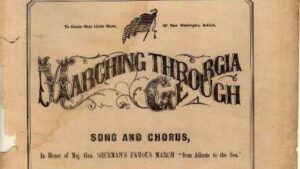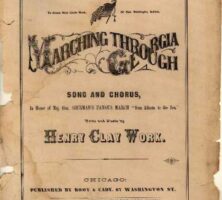The New Georgia Encyclopedia is supported by funding from A More Perfect Union, a special initiative of the National Endowment for the Humanities.
Marching through Georgia, one of the best-known songs of the Civil War, was composed in 1865 by Henry Clay Work. The song celebrates the success of Union general William T. Sherman's march to the sea in 1864.
The New Georgia Encyclopedia does not hold the copyright for this media resource and can neither grant nor deny permission to republish or reproduce the image online or in print. All requests for permission to publish or reproduce the resource must be submitted to the rights holder.
The Savannah Theatre opened in late 1818, with productions of the comedies Soldier's Daughter and Raising the Wind, and incorporated twenty years later. Theater was the predominant form of entertainment in antebellum Georgia, and performances often incorporated popular songs of the day.
Courtesy of Georgia Historical Society, Cordray-Foltz Photography Studio photographs, #GHS 1360-03-06-06.
The New Georgia Encyclopedia does not hold the copyright for this media resource and can neither grant nor deny permission to republish or reproduce the image online or in print. All requests for permission to publish or reproduce the resource must be submitted to Georgia Historical Society.
Lowell Mason, known as the "Father of School Music" influenced the development of urban sacred music, as well as music education, in antebellum Georgia. A native of Massachusetts, Mason led the "better music movement," which favored the works of European classical composers, in his adopted home of Savannah.
From What We Hear in Music, by A. S. Faulkner
The New Georgia Encyclopedia does not hold the copyright for this media resource and can neither grant nor deny permission to republish or reproduce the image online or in print. All requests for permission to publish or reproduce the resource must be submitted to the rights holder.
Jesse Mercer, a prominent Baptist leader in Georgia, served as president of the Georgia Baptist Convention from 1822 until his death in 1841. Also an active publisher, Mercer compiled a hymnal in 1810 and edited the Christian Index, a Baptist newspaper, from 1833 to 1840. In 1833 he founded Mercer Institute, which later became Mercer University.
The New Georgia Encyclopedia does not hold the copyright for this media resource and can neither grant nor deny permission to republish or reproduce the image online or in print. All requests for permission to publish or reproduce the resource must be submitted to the rights holder.
The shape-note system in The Sacred Harp uses a different shape to represent each of the four syllables in the musical scale: a triangle (fa), a circle (sol), a rectangle (la), and a diamond (mi).
The tune "Windham" as it appears in The Sacred Harp, 1911 edition. Image from Wikimedia.
The New Georgia Encyclopedia does not hold the copyright for this media resource and can neither grant nor deny permission to republish or reproduce the image online or in print. All requests for permission to publish or reproduce the resource must be submitted to the rights holder.






